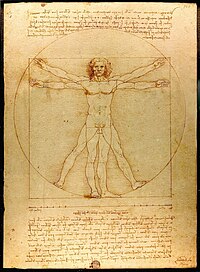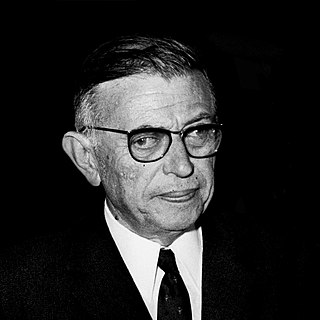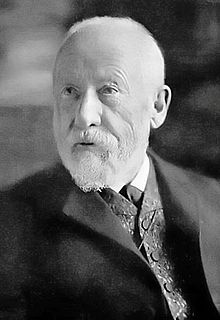| Part of a series on |
| Humanism |
|---|
 |
| Philosophy portal |
Existential humanism is humanism that validates the human subject as struggling for self-knowledge and self-responsibility. [1]
| Part of a series on |
| Humanism |
|---|
 |
| Philosophy portal |
Existential humanism is humanism that validates the human subject as struggling for self-knowledge and self-responsibility. [1]
Søren Kierkegaard suggested that the best use of our capacity for making choices is to freely choose to live a fully human life, rooted in a personal search for values, rather than an external code. [2]
Jean-Paul Sartre said "existentialism is a humanism" because it expresses the power of human beings to make freely-willed choices, independent of the influence of religion or society. [3] Unlike traditional humanisms, however, Sartre disavowed any reliance on an essential nature of man – on deriving values from the facts of human nature – but rather saw human value as self-created through undertaking projects in the world: experiments in living. [4]
Albert Camus, in his book The Plague , suggests that some of us may choose to be heroic, even knowing that it will bring us neither reward nor salvation;[ citation needed ] and Simone de Beauvoir, in her book The Ethics of Ambiguity , argues that embracing our own personal freedom requires us to fight for the freedoms of all humanity. [5]
Martin Heidegger attacked Sartre's concept of existential humanism in his Letter on Humanism of 1946, accusing Sartre of elevating Reason above Being. [6]
Michel Foucault followed Heidegger in attacking Sartre's humanism as a kind of theology of man, [7] though in his emphasis on the self-creation of the human being he has in fact been seen as very close to Sartre's existential humanism. [8]

Existentialism ( ) is a form of philosophical inquiry that explores the problem of human existence and centres on the experience of thinking, feeling, and acting. In the view of the existentialist, the individual's starting point has been called "the existential angst", a sense of dread, disorientation, confusion, or anxiety in the face of an apparently meaningless or absurd world. Existentialist thinkers frequently explore issues related to the meaning, purpose, and value of human existence.

Jean-Paul Charles Aymard Sartre was a French philosopher, playwright, novelist, screenwriter, political activist, biographer, and literary critic. He was one of the key figures in the philosophy of existentialism and phenomenology, and one of the leading figures in 20th-century French philosophy and Marxism. His work has also influenced sociology, critical theory, post-colonial theory, and literary studies, and continues to influence these disciplines.

Simone Lucie Ernestine Marie Bertrand de Beauvoir was a French writer, intellectual, existentialist philosopher, political activist, feminist, socialist, and social theorist. Though she did not consider herself a philosopher, and even though she was not considered one at the time of her death, she had a significant influence on both feminist existentialism and feminist theory.

Existentialism Is a Humanism is a 1946 work by the philosopher Jean-Paul Sartre, based on a lecture by the same name he gave at Club Maintenant in Paris, on 29 October 1945. In early translations, Existentialism and Humanism was the title used in the United Kingdom; the work was originally published in the United States as Existentialism, and a later translation employs the original title. The work, once influential and a popular starting-point in discussions of Existentialist thought, has been widely criticized by philosophers, including Sartre himself, who later rejected some of the views he expressed in it.

Continental philosophy is a set of 19th- and 20th-century philosophical traditions from mainland Europe. This sense of the term originated among English-speaking philosophers in the second half of the 20th century, who used it to refer to a range of thinkers and traditions outside the analytic movement. Continental philosophy includes German idealism, phenomenology, existentialism, hermeneutics, structuralism, post-structuralism, deconstruction, French feminism, psychoanalytic theory, and the critical theory of the Frankfurt School as well as branches of Freudian, Hegelian and Western Marxist views.

Authenticity is a concept of personality in the fields of psychology, existential psychotherapy, existentialist philosophy, and aesthetics. In existentialism, authenticity is the degree to which a person's actions are congruent with his or her values and desires, despite external pressures to social conformity. The conscious Self comes to terms with the condition of Geworfenheit, of having been thrown into an absurd world not of his or her own making, thereby encountering external forces and influences different from and other than the Self. In human relations, a person’s lack of authenticity is considered bad faith in dealing with other people and with one's self; thus, authenticity is in the instruction of the Oracle of Delphi: “Know thyself.”
Being-in-itself is the self-contained and fully realized being of objects. It is a term used in early 20th century continental philosophy, especially in the works of Martin Heidegger, Jean-Paul Sartre, Simone de Beauvoir, and the existentialists.

Bad faith is a sustained form of deception which consists of entertaining or pretending to entertain one set of feelings while acting as if influenced by another. It is associated with hypocrisy, breach of contract, affectation, and lip service. It is not to be confused with heresy. It may involve intentional deceit of others, or self-deception.
Existential phenomenology encompasses a wide range of thinkers who take up the view that philosophy must begin from experience like phenomenology, but argues for the temporality of personal existence as the framework for analysis of the human condition.

Nausea is a philosophical novel by the existentialist philosopher Jean-Paul Sartre, published in 1938. It is Sartre's first novel and, in his own opinion, one of his best works.
Feminism is a collection of movements aimed at defining, establishing, and defending equal political, economic, and social rights for women. Existentialism is a philosophical and cultural movement which holds that the starting point of philosophical thinking must be the individual and the experiences of the individual, that moral thinking and scientific thinking together are not sufficient for understanding all of human existence, and, therefore, that a further set of categories, governed by the norm of authenticity, is necessary to understand human existence. This philosophy analyzes relationships between the individual and things, or other human beings, and how they limit or condition choice.
Existential psychotherapy is a form of psychotherapy based on the model of human nature and experience developed by the existential tradition of European philosophy. It focuses on concepts that are universally applicable to human existence including death, freedom, responsibility, and the meaning of life. Instead of regarding human experiences such as anxiety, alienation and depression as implying the presence of mental illness, existential psychotherapy sees these experiences as natural stages in a normal process of human development and maturation. In facilitating this process of development and maturation, existential psychotherapy involves a philosophical exploration of an individual's experiences stressing the individual's freedom and responsibility to facilitate a higher degree of meaning and well-being in their life.
In the philosophy of existentialism, bad faith is the psychological phenomenon whereby individuals act inauthentically, by yielding to the external pressures of society to adopt false values and disown their innate freedom as sentient human beings. Bad faith also derives from the related concepts of self-deception and ressentiment.
In philosophy, facticity has multiple meanings--from "factuality" and "contingency" to the intractable conditions of human existence.
The proposition that existence precedes essence is a central claim of existentialism, which reverses the traditional philosophical view that the essence of a thing is more fundamental and immutable than its existence. To existentialists, human beings—through their consciousness—create their own values and determine a meaning for their life because the human being does not possess any inherent identity or value. That identity or value must be created by the individual. By posing the acts that constitute them, they make their existence more significant.
Abandonment, in philosophy, refers to the infinite freedom of humanity without the existence of a condemning or omnipotent higher power. Original existentialism explores the liminal experiences of anxiety, death, "the nothing" and nihilism; the rejection of science as an adequate framework for understanding human being; and the introduction of "authenticity" as the norm of self-identity, tied to the project of self-definition through freedom, choice, and commitment. Existential thought bases itself fundamentally in the idea that one's identity is constituted neither by nature nor by culture, since to "exist" is precisely to constitute such an identity. It is from this foundation that one can begin to understand abandonment and forlornness.
Atheistic existentialism is a kind of existentialism which strongly diverged from the Christian existential works of Søren Kierkegaard and developed within the context of an atheistic world view. The philosophies of Søren Kierkegaard and Friedrich Nietzsche provided existentialism's theoretical foundation in the 19th century, although their differing views on religion proved essential to the development of alternate types of existentialism. Atheistic existentialism was formally recognized after the 1943 publication of Being and Nothingness by Jean-Paul Sartre and Sartre later explicitly alluded to it in Existentialism is a Humanism in 1946.

A philosophy of life is any general attitude towards, or philosophical view of, the meaning of life or of the way life should be lived. The term is generally used in an informal sense, meaning a personal philosophy whose focus is resolving basic existential questions about the human condition rather than an academic philosophical endeavour.
This is a list of articles in continental philosophy.
Some observers believe existentialism forms a philosophical ground for anarchism. Anarchist historian Peter Marshall claims, "there is a close link between the existentialists' stress on the individual, free choice, and moral responsibility and the main tenets of anarchism".